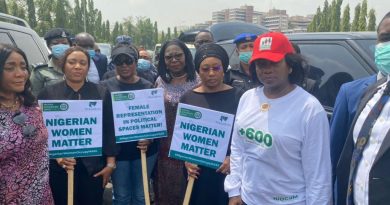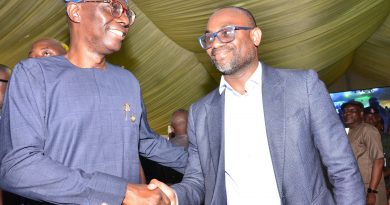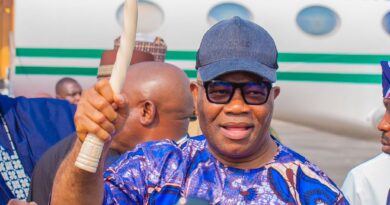63rd Independence Anniversary: Ethnic Nationalities Call For A New Constitution For Nigeria … Frowns At How Ethnic Groups Are Being Cut Off From Their Ancestral Homes
As Nigeria celebrates 63 years of its independence, a non-governmental organisation, Coalition of Indigenous Ethnic Nationalities (CIEN), has advocated ‘a drastic change’ if the country is to continue as a nation.
Its position was contained in press statement it issued to congratulate Nigerians on this occasion of 63rd independence anniversary and signed by representatives of various ethnic nationalities in the country.
According to the body, “109 years after amalgamation of diverse ethnic nationalities of various sizes, cultures and aspirations and 63 years after independence” Nigeria is “still unable to live together in harmony or accept a common national identity”.
It submitted that this year’s independence celebration provided an opportunity to “re-examine and decide on the relationship the ethnic nationalities want with each other and chart a new path for peace and prosperity rather than continue to suffer in this debilitatingly unproductive relationship”.
The CIEN argued that problems besetting Nigeria were foundational requiring structural re-engineering as reflected in “weak governance structures, ethno-religious conflicts, inequality, and inequitable power relations have exacerbated our situation, leaving a trail of perennial crisis, ethnic distrust, and social unrest in their wake”.
While regretting that the independence of 1960 “has turned out to be a stealthy replacement of Western imperialism with the yoke of settler colonialism”, the body added that “indigenous communities in Nigeria have faced a myriad of challenges, including environmental degradation, land dispossession, the threat of annihilation and lack of access to essential services”.
It then called for a new constitution that would return the country to “a symmetric federal structure with a guarantee of equal representation to all regions and equitable distribution of power that ensures the rights of every Nigerian irrespective of population size of the region or of place of birth or faith”.
The Coalition insisted that “Indigenous people should be constitutionally empowered by the regions to develop, control, and use their lands and natural resources. The right to regulate the entry of migrants, the right to stay in the territories, and the right to claim parts of ancestral land previously reserved for various purposes except those reserved and intended for common and public welfare and service should revert to the people”.
Insisting that indigenous communities have strong connections with their environment, CIEN argued that ownership of ancestral lands should “be private, collective, or communal as may be considered by the regions”.
Following the statement in full:
Coalition of Indigenous Ethnic Nationalities (CIEN) Restoring Symmetric Federalism: A Call for Nigeria’s Indigenous Ethnic Groups to Empower themselves.
We, the Coalition of Indigenous Ethnic Nationalities (CIEN), congratulate Nigerians on the 63rd independence anniversary and express our deep concern for the indigenous peoples of Nigeria.
This year’s independence is a call for introspection. 109 years after amalgamation of diverse ethnic nationalities of various sizes, cultures and aspirations and 63 years after independence, we are still unable to live together in harmony or accept a common national identity.
All concerned will do well to reflect on what has happened since. This year’s independence offers us that rare opportunity to re-examine and decide on the relationship the ethnic nationalities want with each other and chart a new path for peace and prosperity rather than continue to suffer in this debilitatingly unproductive relationship.
The indigenous communities in Nigeria have faced a myriad of challenges, including environmental degradation, land dispossession, the threat of annihilation and lack of access to essential services. As we reflect on the current political situation in the country, it is crucial to acknowledge and address these pressing issues.
Reflecting on the past and present and projecting into the future will offer us the opportunity to chart a peaceful path to a better future. The outlook is presently not encouraging.
To the indigenous people of Nigeria, the so-called independence of 1960 has turned out to be a stealthy replacement of Western imperialism with the yoke of settler colonialism.
Indigenous communities are known to have a strong connection to their environment.
But when this is degraded as is often the case with solid mineral mining and oil exploration and extraction, devastating environmental pollution, including oil spills is the consequence and the indigenous people are the first casualties of the security challenges, health and local ecosystems hazards.
It is also clear that what is happening in many regions across the country are not banditry or farmer/herder clashes but calculated and systemic attempts to forcibly dislodge the indigenous people and take over their ancestral land as a settler colonialism strategy.
Being blessed with mineral resources has thus become a curse rather than a blessing to the indigenous ethnic groups.
Indigenous people are being oppressed and have become most endangered even in their homes and government policies and practices have failed to protect their rights and well-being.
Nigeria returned to civil rule in 1999. The current president is the fifth in twenty-four years.
But regardless, the present and past governments have not demonstrated the capacity or willingness to protect the indigenous people of Nigeria.
The current federal system, with its over-centralization, is more of a unitary system.
The foundational problems, weak governance structures, ethno-religious conflicts, inequality, and inequitable power relations have exacerbated our situation, leaving a trail of perennial crisis, ethnic distrust, and social unrest in their wake.
The plight of Nigeria’s indigenous ethnic groups has reached a critical juncture, demanding a collective commitment to change and pragmatic actions from all stakeholders.
Drastic change is imperative if Nigeria is to remain a single entity for long.
It is time for a national rebirth and to frontally confront the challenges, foster unity, and rebuild the nation on the principles of justice, inclusivity and sustainable development.
The much-needed Nigeria’s rebirth cannot be accomplished without first facing the damning realities of our history and different cultures and aspirations.
We need to dispassionately articulate and confront the fears of the indigenous ethnic groups and strategically work at getting a structure that will assuage the ingrained distrust.
Our leaders must exhibit an unwavering commitment to the vision of mutual respect, peaceful coexistence, stability, and prosperity and take bold steps to implement necessary reforms.
We therefore call upon the government that is currently in place to take immediate and concrete actions to address these concerns.
The Coalition of Indigenous Ethnic Nationalities (CIEN) hereby submits that:
1. It is time to reevaluate the country’s federalism structure and restore a symmetric federalism to ensure the freedom and empowerment of indigenous ethnic groups.
2. A return to symmetric federalism would devolve more powers and resources to the states and regions, empowering them to address local issues effectively.
3. Ownership of ancestral lands should be private, collective, or communal as may be considered by the regions. Indigenous people should be constitutionally empowered by the regions to develop, control, and use their lands and natural resources. The right to regulate the entry of migrants, the right to stay in the territories, and the right to claim parts of ancestral land previously reserved for various purposes except those reserved and intended for common and public welfare and service should revert to the people.
4. It is time we write a new constitution with the expressed consent of and owned by the people, for regions to form a symmetric federation of equal status and with a weak centre. The new constitution should determine relationships between the regions and how the nation is to be governed.
5. The new constitution should revert Nigeria to a symmetric federal structure with a guarantee of equal representation to all regions and equitable distribution of power that ensures the rights of every Nigerian irrespective population size of the region, or of place of birth or faith.
6. There should be a proper delineation of regional and international boundaries.
7. The regions should determine their governance structure and enshrine the same in their own constitution.
Coalition of Indigenous Ethnic Nationalities (CIEN) believes that a restructured Nigeria along the above-stated principles will assist in overcoming our historical obstacles and forge a path toward uplifting indigenous communities economically, providing them with the resources and opportunities needed for sustainable development. Coalition of Indigenous Ethnic Nationalities (CIEN) calls upon the Nigerian government, civil society organizations, and the international community to work collaboratively and seize the opportunity of this year’s anniversary to initiate a comprehensive rebirth programme that will address the foundational issues and ensure the rights and dignity of indigenous peoples are upheld. Silence in the face of injustice is complicity.
Nigeria and Nigerians will be great again. Happy anniversary, Nigeria. Happy anniversary, Nigerians.
May God grant us courage and wisdom to do the needful. ________________________________________
Prof. Benjamin OKABA On behalf of the following Members that were Present at the Inaugural Meeting:
1. Prof. Benjamin OKABA (Chairman) – Ijaw National Congress
2. Timothy B. GANDU (Co-Chairman) – Southern Kaduna Leadership Council
3. Mr. Nubari SAATAH (Secretary) – Niger Delta Congress
4. Dr. Akin FAPOHUNDA – The Afenifere Organization
5. Prof. Ejeikwu Emmanuel OLOJA – Kwararafa Union,
6. Chief Owolabi OLADEJO – Voice of Reason in Yorubaland
7. Prof. Chris AKPOTU – Isoko Development Union
8. Mr. Tochukwu IFENEME – The Mandate Project
9. Barr Daniel MAKOLO – Amakpilo Igala Nation
10. Prof. Offiong Akwa (Represented)—Ibom Republic
11. Mr. Kemedengiyefa Opia—Niger Delta Congress
12. Dr. Lloyd Ukwu—NADECO USA/Niger Delta Congress
13. Mr. Emma Ogebe—Justice for Jos
14. Mrs. Ene Ede—Idoma Nation
15. Mr. Austin Davou—Berom Nation
16. Mr. Dogini CHIDI – Ekpeye Liberation Movement




